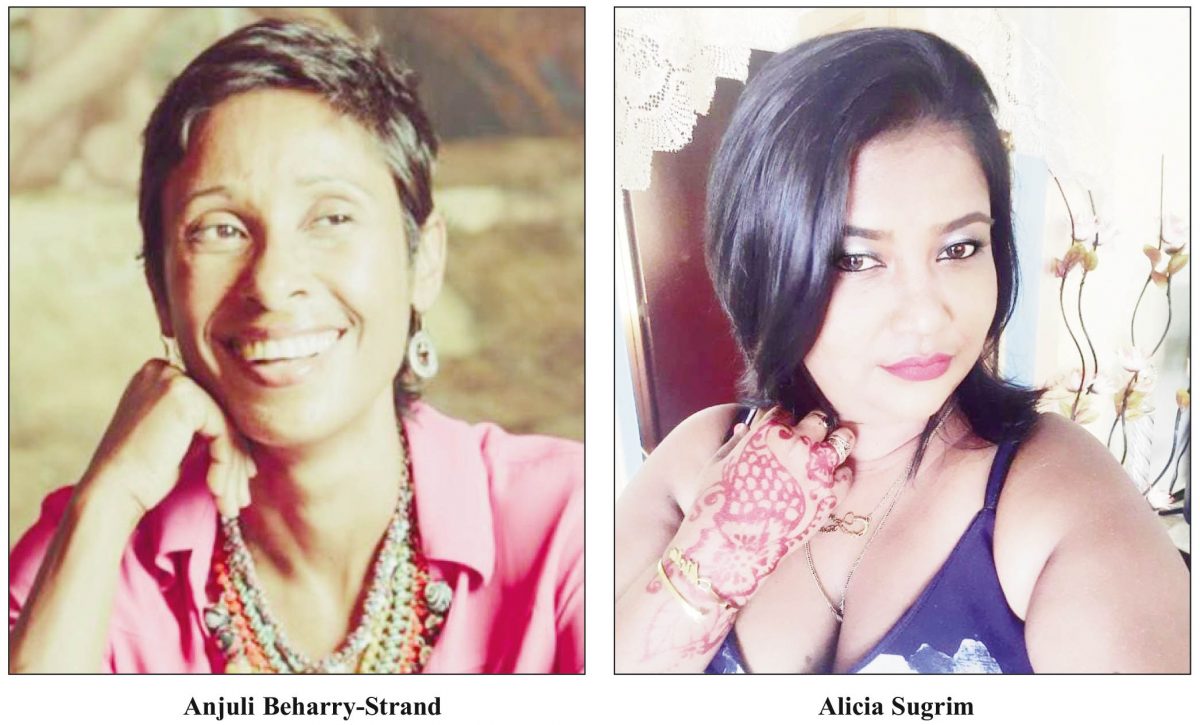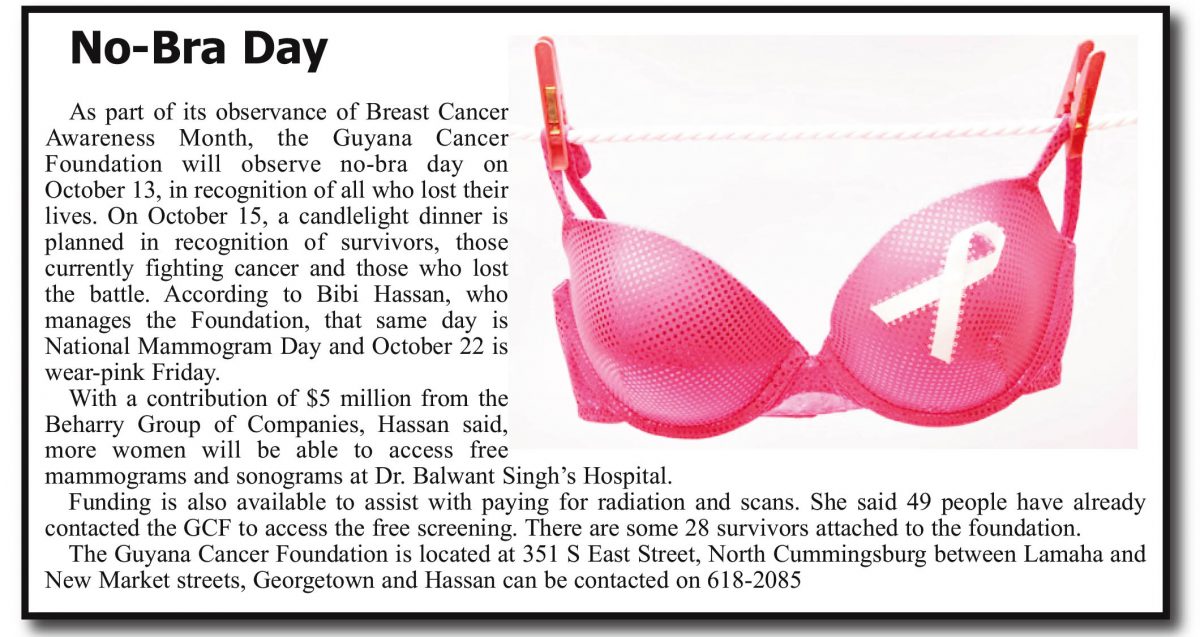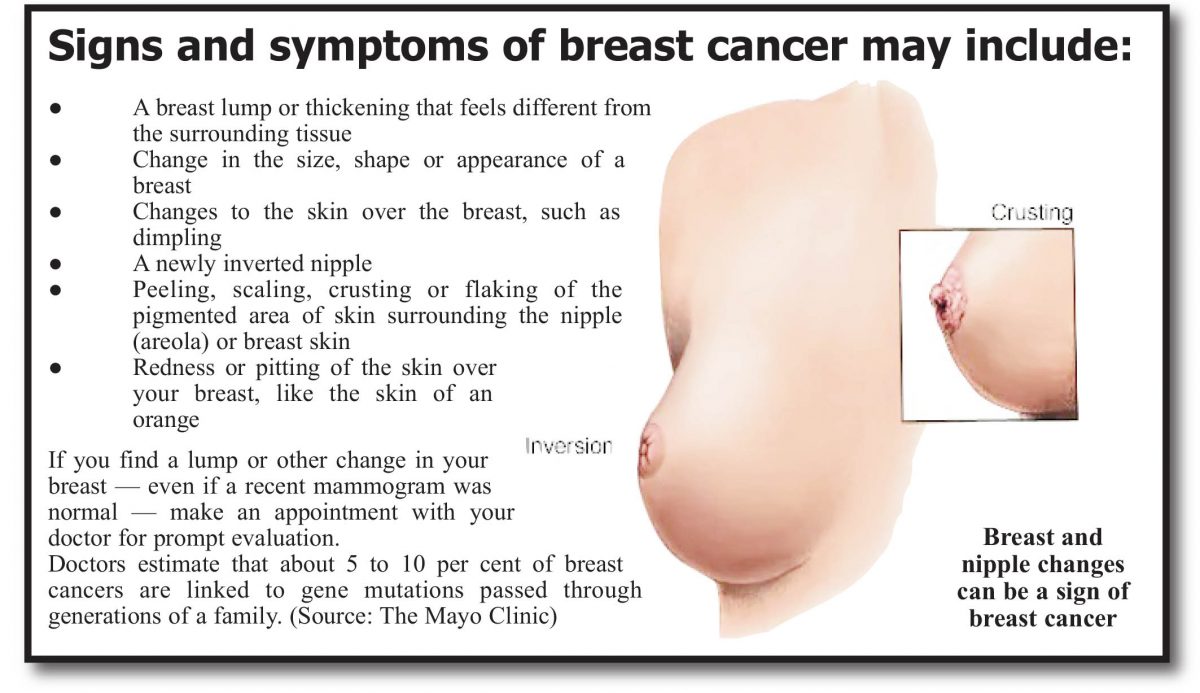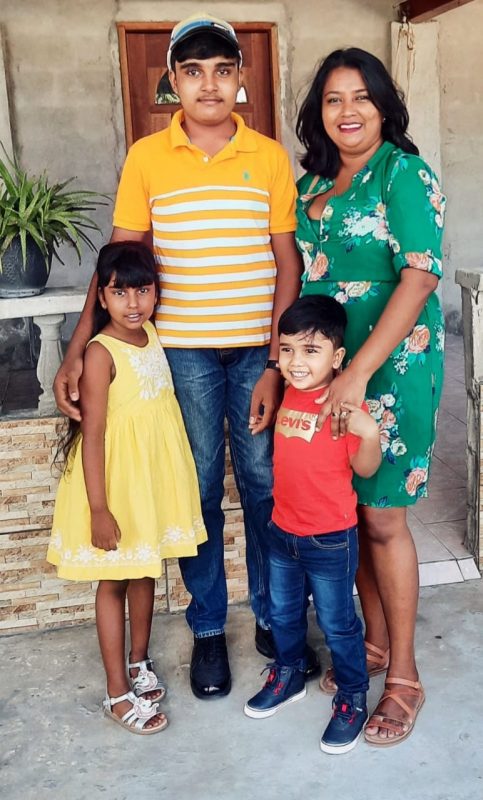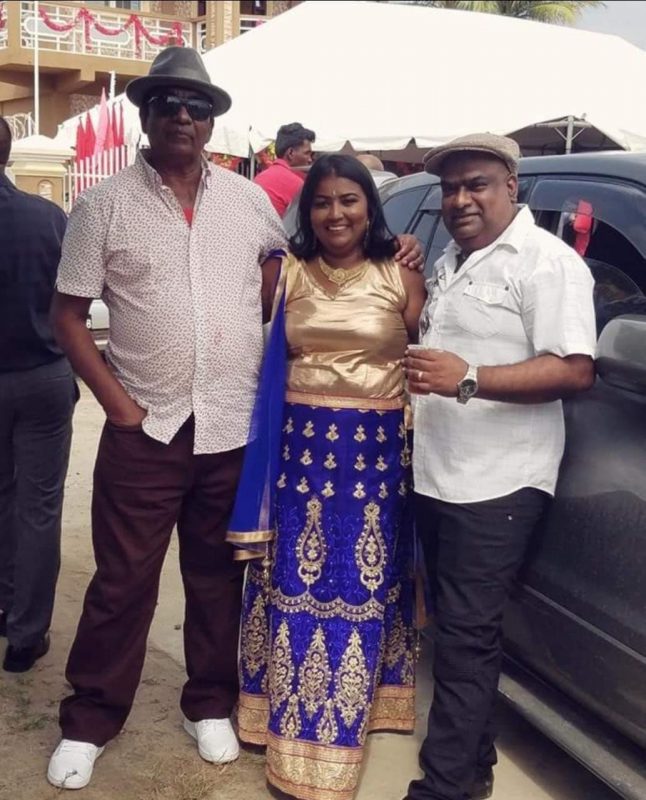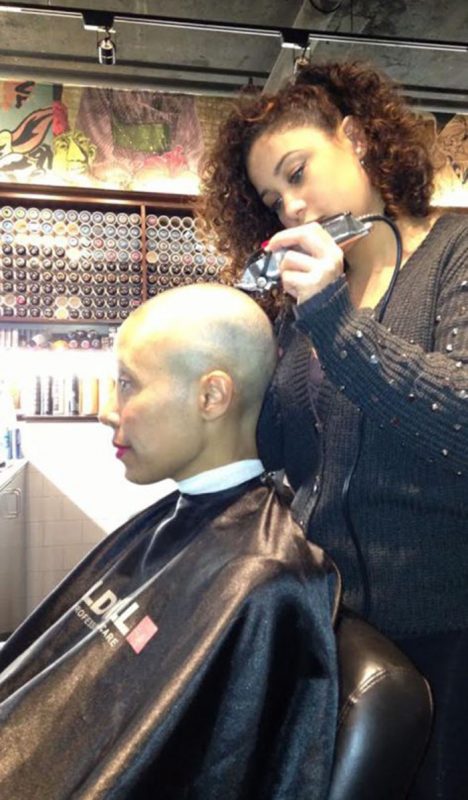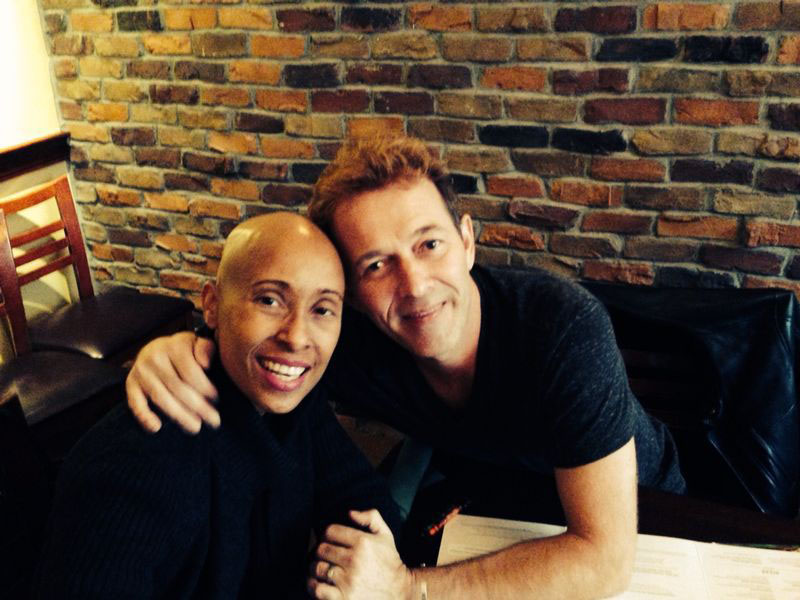The news of a breast cancer diagnosis can break the strongest woman but what makes the difference, apart from the treatment rendered, according to two survivors, is a positive outlook and family support.
These women are as different as they come but they are both mothers, have had mastectomies, are consumed by fear at times but still want to be outspoken on the issue in an effort to assist other women, even as they strengthen themselves by sharing their stories.
October is designated Breast Cancer Awareness Month and for Anjuli Beharry-Strand and Alicia Sugrim there could not be a better time to talk about the illness and encourage women to have themselves checked and if diagnosed, to roll up their sleeves and face the treatment regimen like bosses.
Beharry-Strand, marketing director at one of Guyana’s largest conglomerates — the Beharry Group of Companies — had double mastectomies some eight years ago. Sugrim is a housewife who had a mastectomy last month and has not yet started chemotherapy, but she believes sharing her struggle so far is important.
Beharry-Strand has told her story many times before and even though she is cancer free, her journey is still relevant. “What I want for women in this country is for them to be able to have access to care. So we have societies here that are doing as best as they can. They are doing wonderful work, screening and providing these women with whatever they need. But I think more information has to get out there where women have to learn that it is not just breast cancer, it is different types of cancer that require different types of treatment,” Beharry-Strand told Stabroek Weekend during an interview.
She also stressed that results need to be returned much faster as cancer cells reproduce very quickly especially if it is an aggressive form.
According to the Mayo Clinic, after skin cancer, breast cancer is the most common cancer diagnosed in women and while it can occur in both men and women it is far more common in women. The clinic indicated that substantial support for breast cancer awareness and research funding has helped create advances in the diagnosis and treatment and survival rates have increased, largely due to factors such as earlier detection, a new personalized approach to treatment and a better understanding of the disease.
In Guyana, early detection continues to be an issue. One expert in the field shared that women continue to have late diagnoses as they ignore calls to have regular mammograms or self checks. This is where Beharry-Strand and Sugrim believe their stories can help.
Itching
It was at the age of 42, soon after she had given birth to the youngest of her five children who is now nine, Beharry-Strand said, that her left breast started to itch a lot.
“In January [of 2013] it was just this intense itching every night at the top of my left breast, I took Benadryl and that stopped the itching so I thought it was an allergy of some sort,” she said.
The following month she had a mammogram done in the US and nothing suspicious was found but a few months later in August she felt a lump and one local doctor told her he thought it was “lumpy breast” while another advised that she go abroad and get it checked.
She followed the latter’s advice immediately and following a sonogram and a mammogram, a biopsy was ordered.
While at lunch the following day, Beharry-Strand was called and given the diagnosis: stage one triple-negative breast cancer, considered to be more aggressive with a poorer prognosis than other types of breast cancer. She can still remember that her legs froze, her appetite went and she quickly requested that her lunch companions take her to her apartment.
“I couldn’t think of anything else except I have a young child, young children and I don’t want to die. I don’t think I have ever felt more terrified in my life…,” she said.
She cried for hours.
Four days later, she endured a seven-hour surgery to have both of her breasts removed, a decision she made because of the aggressive nature of the cancer. She noted that a double mastectomy does not improve one’s survival rate but it gave her peace of mind.
Beharry-Strand said she agreed to have breast reconstruction later and the doctor put in the spacer for this to be done during the seven-hour surgery.
“After surgery I was very sick. I went home to heal. I had a lot of tubes sticking out of me and my daughter turned a year five days after I had my breasts removed. So I couldn’t leave her for a long time… You had to learn to move your hands again, do all sorts of exercises. It was a very painful process,” she shared.
Six weeks later she returned to the US to commence chemotherapy. That was grueling, but having her baby daughter with her made her want to fight.
“I never understood what people meant when they said you have to fight for your life until I was in it and then I couldn’t just lie down and be sick… I didn’t have time for that. In 24 hours after the chemotherapy I had to self-inject myself with something called Neulasta, which makes your body produce white blood cells very quickly so that you don’t get run down…,” she said.
After the injection she endured intense pain from her head to her toes. It was painful for her to get out of bed, bend down, walk but she had no choice as she had to take care of her young daughter.
But it was at the point when she decided to shave her head instead of allowing the chemotherapy to slowly remove her hair—she took control and fought the cancer.
“That is when I was able to say cancer I am going to kick you to the curb because you don’t own me. This is my body and I get to tell you when I am going to give up fighting and I am never going to give up fighting,” she said with a small laugh.
Her biggest fear was her husband seeing her without hair for the first time. But when he saw her, he said, ‘you are beautiful, you look even more beautiful without hair’ and for her that meant everything even though she had also lost her eyebrows, body hair, her nails were black and she could not taste her food.
“But I would say I laughed a lot and I drew strength from my family. My family, they were amazing, my co-workers, they were so supportive. I wanted for nothing at any point in time,” she added. She returned to work after the chemotherapy and a few months later she returned to the US for the reconstructive surgery, a process she had envisioned was going to be easy but which proved to be very difficult.
It was at this point during the interview that Beharry-Strand allowed herself to show some weakness and tears slipped from the sides of her eyes even as she quickly dried them up.
“I thought, ‘Great, I am going to get implants and then I am going to look like a normal woman again…,’” she said.
From the outside it may have looked normal, but for her the implants looked like “misshapen balls on my chest”.
She grieved for a very long time but support from her family pulled her through and eventually she was “okay”. But she lost her mom in 2015 and endured another rough patch.
There is a link between certain types of breast implants and the possibility of developing a lymphoma and she had the option of keeping an eye out for any abnormalities in her body or just removing them. In 2019, she said, she decided to get rid of the implants and “for the first time in my life I felt like a breast cancer patient”.
“I could never fully grasp the destruction… until I took my breasts off because I had nothing. … I had big boobs naturally and then I went to these implants and then I went to nothing, to just bare chest, rib cage.”
She was devastated. She felt crippled, insecure and heartbroken. The tears came again.
‘Hardest thing’
To look so “completely different” was the “hardest thing I had ever gone through in my life,” she said.
It was so tough that last year she sought the assistance of a therapist and it was that person, Beharry-Strand said, who “brought me back to life” and one of the comparisons she used was ballerinas who are all flat chested but among the most beautiful women.
“Whenever you look at yourself in the mirror, she said, think of yourself as a ballerina and it changed everything about how I viewed myself and my body,” she said, revealing that she had to get a new wardrobe.
She bought prosthetic breasts and some days she wears them and other days she goes without. As she puts it, she has the option of “boobs or no boobs”. The laughter returned at this point.
Just like she shed tears during the interview, Beharry-Strand said there are still days when she cries and she believes this is healthy as when it is held inside then the grief becomes worse.
‘My whole world came tumbling down’
In Sugrim’s case, she recalled that she was having some fun with her children and husband when a lump was felt in one of her breasts. When she examined it, she felt it was normal. But within a few days it became more pronounced and she visited the doctor.
Her husband, Wilet Sugrim, was at her side when she was told she had stage three breast cancer.
“It was like my whole world came tumbling down in a sense. The only thing that I could imagine that keeps coming to me is that I am seeing my children’s faces,” she said. The 35-year-old has three children, aged 14, 7 and 4 years old.
She was assured by the doctor that breast cancer does not mean a death sentence but it is how one deals with it. She admitted that she had moments where she broke down and “was out of control crying. I couldn’t control the emotion because I was angry, I was hurt. I can’t even begin to explain how I felt.” She questioned why it had to be her, someone who is very health conscious. Her family has a history of diabetes, so she was always careful with her diet and yet she was diagnosed with cancer.
Sugrim said she never blamed herself.
She was advised to have a mastectomy and for a short period, she said, she was “going around in a circle” to find a way to avoid having the surgery, but did it eventually as she reasoned that her life was more important than her looks.
“…It was a hard process though because the recovery stage was very painful but I had a lot of support from family members, my husband, friends,” she said.
Her diagnosis and treatment thus far have shown her how supportive people can be because of the tremendous outpouring of assistance she has received and she admitted that had she been left to fight alone she is not sure how she would have made it.
Her parents, who live close by, especially her father, have stepped in to fill the gap and they have been taking care of her children and cooking for the family since the surgery.
“Other relatives as well, they would support so it is like I have a whole support system…,” she said. “I would always praise my husband, he is a gem of a man. He has been so supportive throughout this, he is at every appointment and he is the one who has been pushing me. I would say without him I don’t know… and my father too. It is like I have a team of two men, one each side…”
Sugrim has joined the Guyana Cancer Foundation (GCF), managed by Bibi Hassan, which has a survivors’ group and the support she receives from the other women has been a source of strength as well.
It has been four weeks since she has had the mastectomy and it is yet to be decided when the chemotherapy would begin.
She has heard horrible stories about the treatment but believes with a positive mindset she will be able to endure and so she is not allowing herself to be consumed by negative thoughts and put herself through unnecessary stress.
Stigma
Both Sugrim and Beharry-Strand believe that it is good to talk about their experiences as a lot of people are ashamed because of the stigma attached to the disease.
“A lot of people… are made to feel that they did something. You didn’t do anything to get cancer. Cancer can happen to you, me, it can happen to anyone in this world. Cancer is just a malfunction in your body,” Beharry-Strand pointed out.
Sugrim believes she can reach more women, some of whom are as very sensitive about their breasts and might prefer to hide the fact that they had mastectomies.
“Not me, I embrace it because with me being this way, and me being open and telling others they can look at me and say if she could do it I can do it… Once you have the support, the people behind you cheering you on… you can do it,” Surgim said.
The survivor said she also tries not to give people a sad version of her story but admitted that there are moments when she breaks down as she does have fears.
Beharry-Strand noted that no one deserves to be sick, people deserve compassion, to be heard, not judged and taken care of and to know they have a safe space or people they can talk to.
Telling someone thank God you are alive is one of the worst things, according to the cancer survivor. While thankful to be alive, people need someone to just listen. “Just put your hands on their shoulders and say ‘It is okay, you can talk. I don’t know how it feels but I am here to hear how you feel.’ They are not asking for advice, they just want to be heard…,” Beharry-Strand said.
Both women stressed that to be able to fight the disease one needs a support mechanism.
Beharry-Strand said she worried about dying and the cancer returning for about a year after the surgery and it consumed her for some time but over the years it became less “until it is time for that checkup”.
Over the years she has lost beautiful strong women to breast cancer and she knew they did not want to die. She noted that early detection is the key. “You have to learn your breasts, love them, do your own self-examination…” and if something feels different check it out, she urged. She also wants to see all women have emotional support, which she had access to in the US. She noted she was “very lucky” to have access to such treatment.
“It is a terrifying thing to hear those words ‘you have cancer’… It is that terror. It is raw. It is fear,” Beharry-Strand said as she called on women to start supporting each other more,
Sugrim urged women to prioritise their health.
